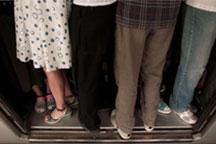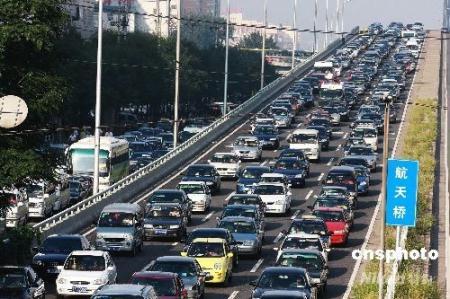Beijing traffic: Nightmare for commuters
2009-10-21 10:02 BJT
Watch Video

 Play Video
Play Video
The fast expansion of the auto sector may be good news for car makers, but not so good for drivers. In Beijing, there are nearly 4 million cars, and that number is growing by the minute. In the last week of August, the traffic control department recorded more than 10-thousand new vehicles. As a result, congestion is becoming a routine part of daily life, creating pressure for drivers and passengers alike and sometimes even leading to incidents of road rage. CCTV reporter takes us to Beijing's famous Ring Roads to tell us more about the situation.
It's nearly 10 in the morning. Cars on the East Third Ring Road are moving slowly, and some of them are simply not moving at all.
The city's traffic watchdog says during the rush hour, the average car speed on some major roads has plummeted to less than 7 kilometers per hour, making Beijing the slowest city in China.
In an attempt to ease traffic congestion, the city has adopted a new policy, restricting the number of cars depending on their license numbers.
But it doesn't really work so well.
A taxi driver in Beijing said, "The restriction didn't help at all. In fact it's making it worse. People just buy another car and the restriction is useless. So there are more cars now. Traffic jams are now common even on weekends."
 |
| In Beijing, there are nearly 4 million cars, and that number is growing by the minute. In the last week of August, the traffic control department recorded more than 10-thousand new vehicles. |
Traffic control experts believe there is a simple solution.
Mao Baohua, Vice President of Metropolitan Transportation Research Center, said, "The key is to persuade people not to drive their private cars and use public transportation instead."

 Mail
Mail Share
Share Print
Print


 Video
Video









 2009 China Central Television. All Rights Reserved
2009 China Central Television. All Rights Reserved